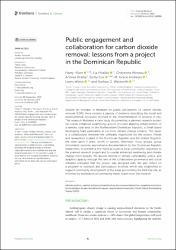Mostrar el registro sencillo del ítem
Public engagement and collaboration for carbon dioxide removal : lessons from a project in the Dominican Republic
| Licencia | This is an open-access article distributed under the terms of the Creative Commons Attribution License (CC BY). The use, distribution or reproduction in other forums is permitted, provided the original author(s) and the copyright owner(s) are credited and that the original publication in this journal is cited, in accordance with accepted academic practice. No use, distribution or reproduction is permitted which does not comply with these terms. | es |
| Autor | Hilser, Harry | |
| Autor | Hiraldo, Lia | |
| Autor | Moreau, Cheyenne | |
| Autor | Draiby, Andrea | |
| Autor | Cox, Emily | |
| Autor | Andrews, M. Grace | |
| Autor | Winks, Lewis | |
| Autor | Walworth, Nathan G. | |
| Fecha de admisión | 2024-04-08T22:38:23Z | |
| Fecha disponible | 2024-04-08T22:38:23Z | |
| Año | 2024 | |
| Citación | Hilser, H., Hiraldo, L., Moreau, C., Draiby, A., Cox, E., Andrews, M. G., ... & Walworth, N. G. (2024). Public engagement and collaboration for carbon dioxide removal: lessons from a project in the Dominican Republic. Frontiers in Climate, 6, 1290999. Recuperado de: | es |
| URI | https://bvearmb.do/handle/123456789/4341 | |
| Sinopsis | Despite an increase in literature on public perceptions of carbon dioxide removal (CDR), there remains a paucity of evidence describing the social and developmental processes involved in the implementation of projects in-situ. This research illustrates a case study documenting a planned research project for coastal enhanced weathering—a form of ocean alkalinity enhancement—in a remote, rural area of the Northwestern Dominican Republic, a Small Island Developing State particularly at risk from climate change impacts. This paper is a collaboration between the company responsible for the project (Vesta) and researchers located in the Dominican Republic and the United Kingdom, We draw upon 2 years' worth of surveys, interviews, focus groups, group information sessions, and reflexive documentation by the Dominican Republic researchers, to present a first-hand account of local community responses to the planned research project and to coastal enhanced weathering and climate change more broadly. We discuss themes of climate vulnerability, justice, and adaptive capacity through the lens of the collaborative governance and social diffusion principles that the project was designed with. We also reflect on a program of outreach and participatory activities which was established to support community development in the areas surrounding the field trial site, as informed by exploration of community needs drawn from the research. | es |
| Idioma | English | es |
| Publicado | Frontiers in Climate, 6, 1290999 | es |
| Derechos | © 2024 Hilser, Hiraldo, Moreau, Draiby, Cox, Andrews, Winks and Walworth. | es |
| URI de derechos | http://creativecommons.org/licenses/by/4.0/ | es |
| Materia | Cambio climático | es |
| Materia | Impacto ambiental | es |
| Materia | Emisiones de carbono | es |
| Materia | Gestión ambiental - Planificación | es |
| Materia | Clima - República Dominicana | es |
| Materia | Comunidades rurales | es |
| Título | Public engagement and collaboration for carbon dioxide removal : lessons from a project in the Dominican Republic | es |
| dc.identifier.doi | https://doi.org/10.3389/fclim.2024.1290999 | |
| Tipo de material | Article | es |
| Tipo de contenido | Scientific research | es |
| Acceso | Open | es |
| Audiencia | Technicians, professionals and scientists | es |
Ficheros en el ítem
Este ítem aparece en la(s) siguiente(s) colección(es)
-
Investigación ambiental [1759]
La consulta y descarga de este documento están sujetas a esta licencia: This is an open-access article distributed under the terms of the Creative Commons Attribution License (CC BY). The use, distribution or reproduction in other forums is permitted, provided the original author(s) and the copyright owner(s) are credited and that the original publication in this journal is cited, in accordance with accepted academic practice. No use, distribution or reproduction is permitted which does not comply with these terms.
© 2024 Hilser, Hiraldo, Moreau, Draiby, Cox, Andrews, Winks and Walworth.
© 2024 Hilser, Hiraldo, Moreau, Draiby, Cox, Andrews, Winks and Walworth.


